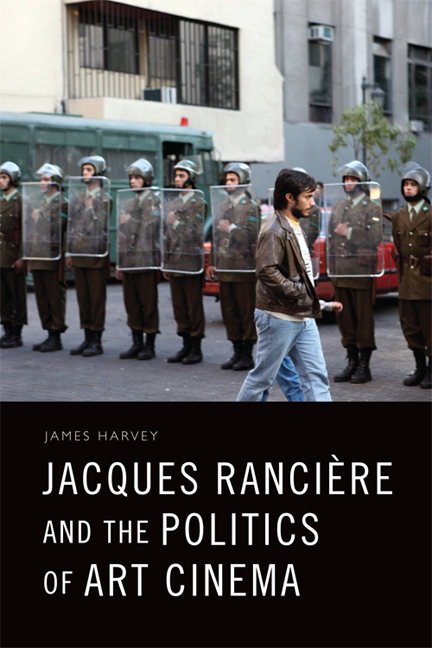Introduction: Politics and Art Cinema
Published online by Cambridge University Press: 28 April 2021
Summary
We know too well that the systemic social violences of inequality are social, historical and economic; that they are so immanently perceivable shows that they are aesthetic also. Who is seen and heard; who speaks and who is spoken to; in what ways one can communicate and how one experiences communication: these issues are still rigidly determined by hierarchies enshrined in tradition and are intensified more than ever in twenty-first-century global capitalism. The aesthetic is the philosophical category describing experience and perception and, as such, it plays a fundamental role in articulating how we experience a social life. The aesthetics of politics must, therefore, play a central role in challenging the mechanics of each social life. As a category of cinema most routinely and self-consciously described as ‘aesthetic’, art films provide acute spaces for the acting out of these challenges. This book is an attempt to shed light on the political potential of art cinema today. My hope is that if we contemplate carefully some notable works of global art cinema in the twentyfirst century, we may delineate in the films an extra-textual engagement with the social malaise in which we find ourselves at present. Geographically and stylistically disparate, the films analysed in this book provide diverse and novel responses to issues that are often global in nature. Even in their social and historical contexts, each of the films discussed allows us to engage with a concept as familiar in sound as it is alien in reality: politics. The aim of this book, therefore, is to argue that such a thing as politics exists in contemporary art cinema.
DEFINING POLITICS
Few thinkers have had more inspiring, innovative things to say about the politics of aesthetics in recent years than Jacques Rancière. Two points made by Rancière in Disagreement (1999) – his seminal text on political philosophy – have provided the inspiration for the arguments made herein. The first regards the way we conceive of politics. For Rancière, it is a word that has been over-assigned; that has been near emptied of its radical historical promise of change and flux; and, as such, has been made synonymous with the day jobs of elected representatives: the people who, supposedly, do politics.
- Type
- Chapter
- Information
- Jacques Rancière and the Politics of Art Cinema , pp. 1 - 22Publisher: Edinburgh University PressPrint publication year: 2018



